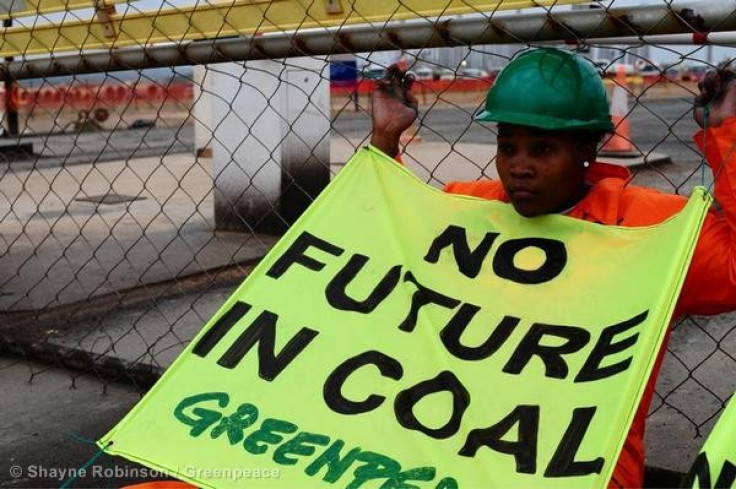Greenpeace Activists Arrested Over Coal Power Plant Protest in South Africa

Three environmental activists protesting the building of the Kusile coal powered plant in South Africa early Monday morning have been arrested, while several others have been removed from the site.
Of the thirteen activists involved in the action, six chained themselves to a 360-foot crane at the construction site of the coal powered plant early Monday morning. Also attached to the crane was a banner that read Kusile: climate killer, according to Greenpeace's website.
Seven others chained themselves to the front gate of the facility.
The protestors held their ground for more than five hours before three of them were arrested at 9 a.m. and six others were forcibly removed from the crane at 9:30 a.m., according to New York Greenpeace spokeswoman Molly Dorozenski,
They were making a statement against the construction of South Africa's Kusile coal power plant, one of two being built and managed by that country's electric utility, Eskom. The power stations will each generate 4,800 megawatts of power, and have alsob previously been the site of labor protests.
In a blog published early Monday on the organization's Africa's website, activist Michael Baillie, who was among the protestors at the site, wrote that coal had no future in South Africa.
I'm here with five other climbers to highlight the true cost of coal power in South Africa, wrote Baillie. Our country has a severe fossil fuel addiction, and coal is our drug - a drug that causes destruction at every step. South Africans cannot afford the costs of this addiction.
The plant will be one of 16 coal plants in the county, and activists claim the facility will increase South Africa's greenhouse gases.
South Africa is already the 12th largest CO2 emitter in the world, and the biggest in Africa. Kusile is not the way to reduce our very real impact on this continent and the African people -- like you and me -- who live here, wrote Baillie.
South Africa is listed as one of the top 25 greenhouse emitting countries according to the World Resources Institute, a global environmental think tank.
This protest came on the heels of Greeenpeace's recently published report on coal use in the county titled The True Cost of Coal in South Africa: paying the price of coal addiction, and in anticipation of the United Nations' intended climate talks in Durban, South Africa from Nov. 28 to Dec. 9.
Greenpeace leaders say shutting down this power plant would prove to the world that South Africa is committed to reducing greenhouse gases.
When the world descends on Durban at the end of this month and people everywhere hope that progress can be made in reaching a climate saving deal, the South African government has a chance to lead, a chance of making history as a champion for the climate, for justice and the planet, said Melita Steele, Greenpeace Africa climate campaigner, in an organizational press release.
It should not squander that chance by letting a government owned utility like Eskom make a mockery of the talks, she added.
Requests for an interview with Eskom were not responded to by press time.
© Copyright IBTimes 2024. All rights reserved.











